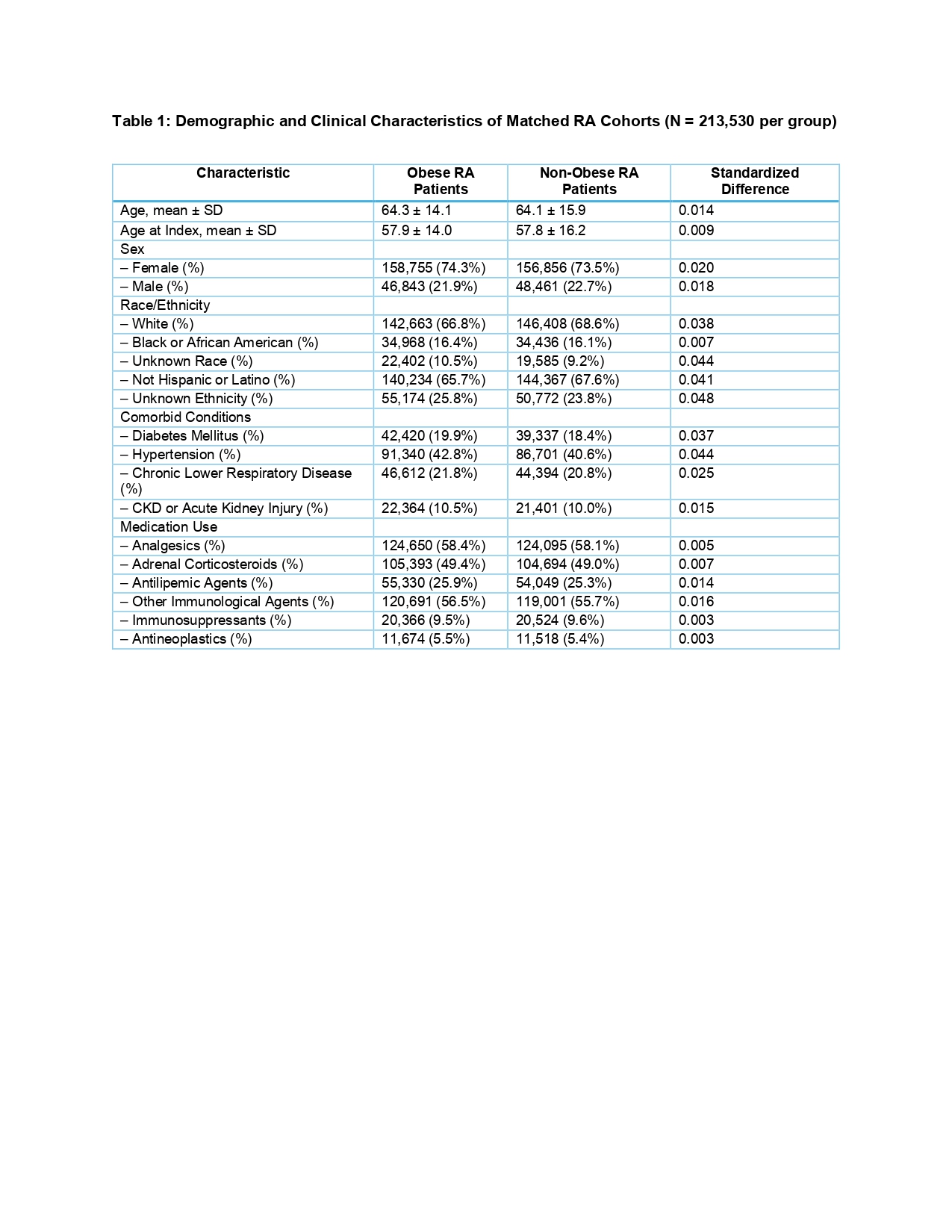Session Information
Session Type: Poster Session B
Session Time: 10:30AM-12:30PM
Background/Purpose: Obesity is traditionally associated with increased morbidity and mortality in the general population. However, in chronic inflammatory conditions like rheumatoid arthritis (RA), an “obesity paradox” has been observed, wherein higher body mass index (BMI) correlates with improved survival outcomes. Studies have reported that RA patients with higher BMI may experience lower mortality rates compared to their normal-weight counterparts. This paradox challenges conventional understanding and underscores the need to explore the relationship between obesity and clinical outcomes in RA.
Methods: A retrospective cohort study was conducted using the TriNetX Global Collaborative Network, encompassing 144 healthcare organizations. Adult RA patients were categorized into obese (BMI ≥30 kg/m²) and non-obese (BMI < 30 kg/m²) cohorts. Propensity score matching (1:1) was employed to balance demographics, comorbidities, and medication use. Outcomes assessed over a 5-year period included all-cause mortality, myocardial infarction (MI), stroke, heart failure, and inflammatory markers (erythrocyte sedimentation rate [ESR], C-reactive protein [CRP]).
Results: Post-matching, each cohort comprised 213,530 patients. Obese RA patients exhibited lower all-cause mortality (6.1% vs. 7.9%; risk ratio [RR]: 0.77), MI (2.5% vs. 3.2%; RR: 0.80), and stroke (2.2% vs. 2.7%; RR: 0.80) compared to non-obese counterparts. Conversely, heart failure incidence was slightly higher in the obese group (6.8% vs. 6.4%; RR: 1.07). ESR levels were elevated in obese patients (mean 28.3 mm/hr vs. 25.5 mm/hr), while CRP levels were marginally lower (mean 20.3 mg/L vs. 21.1 mg/L).
Conclusion: The findings support the existence of an obesity paradox in RA, where obesity is associated with reduced mortality and cardiovascular events. These results suggest that higher BMI may confer a survival advantage in RA patients, potentially due to factors such as greater metabolic reserves or differences in inflammatory profiles. However, the underlying mechanisms remain unclear, and further research is warranted to elucidate the biological and clinical implications of this paradox.
To cite this abstract in AMA style:
Edwards Q, Okeke C, Riley J, Mamoh U, Obianyo C. The Obesity Paradox in Rheumatoid Arthritis: A Propensity-Matched Analysis of Mortality and Cardiovascular Outcomes [abstract]. Arthritis Rheumatol. 2025; 77 (suppl 9). https://acrabstracts.org/abstract/the-obesity-paradox-in-rheumatoid-arthritis-a-propensity-matched-analysis-of-mortality-and-cardiovascular-outcomes/. Accessed .« Back to ACR Convergence 2025
ACR Meeting Abstracts - https://acrabstracts.org/abstract/the-obesity-paradox-in-rheumatoid-arthritis-a-propensity-matched-analysis-of-mortality-and-cardiovascular-outcomes/


.jpg)